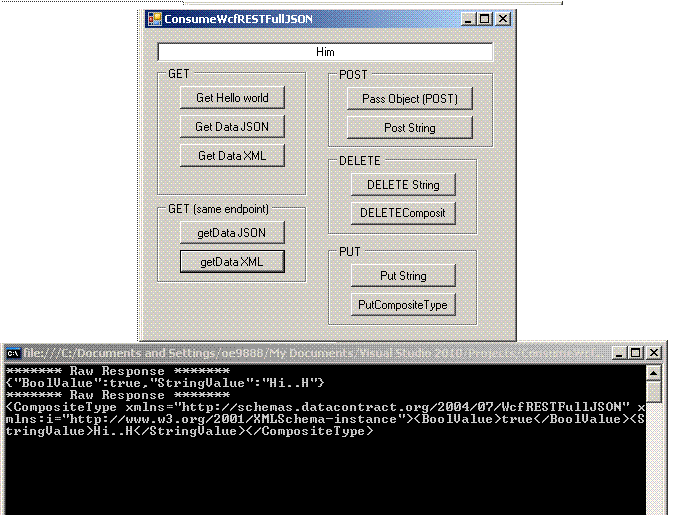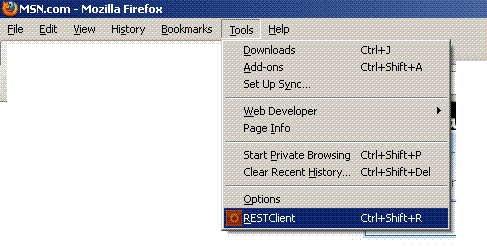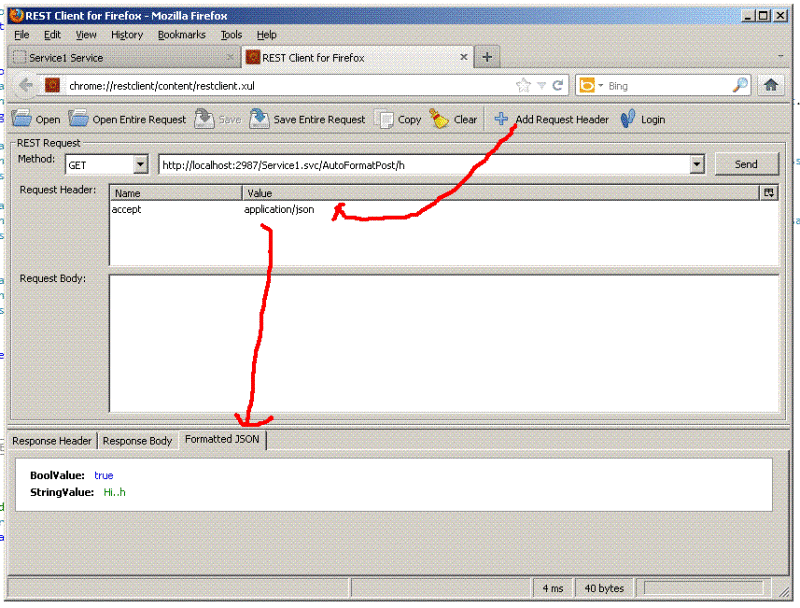Introduction
This article will talk about
- WCF REStful service: with GET, PUT, POST, and DELETE methods
- Web Invoke: Request response on JSON
- See response on console in raw format
- Testing on Mozilla Firefox – REST client
- Automatic format selection for JSON/XML
Background
TheRESTful web service is hosted on IIS. This service will take request and response on JSON. There is no business logic, this is just demo code. Let's see how to prepare a request for GET, PUT, POST, and DELETE methods. With a lot of combination of input parameters and return type. Like take string return object, take object return object, etc.
Server side: Service
 Collapse | Copy Code
Collapse | Copy Code[ServiceContract]
public interface IService1
{
[OperationContract]
[WebInvoke(Method = "GET", UriTemplate = "/GetNoPara",
RequestFormat = WebMessageFormat.Json, ResponseFormat = WebMessageFormat.Json)]
string HelloWorld();
[OperationContract]
[WebInvoke(Method = "GET", UriTemplate = "/GetDataJSON/{value}",
RequestFormat = WebMessageFormat.Json, ResponseFormat = WebMessageFormat.Json)]
CompositeType GetDataJSON(string value);
[OperationContract]
[WebInvoke(Method = "POST", UriTemplate = "/PostString",
RequestFormat = WebMessageFormat.Json, ResponseFormat = WebMessageFormat.Json)]
bool PostTest(string value);
[OperationContract]
[WebInvoke(Method = "POST", UriTemplate = "/PostCompositeType",
RequestFormat = WebMessageFormat.Json, ResponseFormat = WebMessageFormat.Json)]
CompositeType GetDataUsingDataContract(CompositeType composite);
[OperationContract]
[WebInvoke(Method = "PUT", UriTemplate = "/PutString",
RequestFormat = WebMessageFormat.Json, ResponseFormat = WebMessageFormat.Json)]
string PutString(string value);
[OperationContract]
[WebInvoke(Method = "PUT", UriTemplate = "/PutCompositeType",
RequestFormat = WebMessageFormat.Json, ResponseFormat = WebMessageFormat.Json)]
string PutCompositeType(CompositeType composite);
[OperationContract]
[WebInvoke(Method = "DELETE", UriTemplate = "/DeleteString",
RequestFormat = WebMessageFormat.Json, ResponseFormat = WebMessageFormat.Json)]
string DeleteString(string value);
[OperationContract]
[WebInvoke(Method = "DELETE", UriTemplate = "/DeleteCompositeType",
RequestFormat = WebMessageFormat.Json, ResponseFormat = WebMessageFormat.Json)]
CompositeType DeleteCompositeType(string value);Web.config
Setting for automatic format selection for JSON/XML – Just add the following on Web.config serviceBehaviors. This will automatically set the response format as per request type (JSON/XML):
 Collapse | Copy Code
Collapse | Copy Code<endpointBehaviors>
<behavior name="web">
<webHttp automaticFormatSelectionEnabled="true"/>
</behavior>
</endpointBehaviors>Client side: WCF client
The C# Win application is going consume this service and we can see the response in raw data format for JSON and XML.

Code
 Collapse | Copy Code
Collapse | Copy Codeprivate void GetHello_Click(object sender, EventArgs e)
{
WebClient WC = new WebClient();
byte[] res1 = WC.DownloadData(ServiceUrl + "GetNoPara");
Stream res2 = new MemoryStream(res1);
DataContractJsonSerializer res3 = new DataContractJsonSerializer(typeof(string));
string response = res3.ReadObject(res2).ToString();
Console.WriteLine(response);
}
private void HelloToMe_Click(object sender, EventArgs e)
{
GetData(ServiceUrl + "GetDataJSON/" + txtMyName.Text, "JSON");
WebClient WC = new WebClient();
byte[] res1 = WC.DownloadData(ServiceUrl + "GetDataJSON/" + txtMyName.Text);
Stream res2 = new MemoryStream(res1);
DataContractJsonSerializer res3 = new DataContractJsonSerializer(typeof(CompositeType));
CompositeType CT = (CompositeType)res3.ReadObject(res2);
Console.WriteLine(CT.StringValue);
}
private void PassObject_Click(object sender, EventArgs e)
{
WebClient WC = new WebClient();
WC.Headers["Content-type"] = "application/json";
CompositeType CT = new CompositeType();
CT.BoolValue = true;
CT.StringValue = txtMyName.Text;
MemoryStream MS = new MemoryStream();
DataContractJsonSerializer JSrz = new DataContractJsonSerializer(typeof(CompositeType));
JSrz.WriteObject(MS, CT);
byte[] res1 = WC.UploadData(ServiceUrl +
"PostCompositeType", "POST", MS.ToArray());
Stream res2 = new MemoryStream(res1);
JSrz = new DataContractJsonSerializer(typeof(CompositeType));
CT = (CompositeType)JSrz.ReadObject(res2);
Console.WriteLine(CT.StringValue);
}
private void PostTest_Click(object sender, EventArgs e)
{
WebClient WC = new WebClient();
WC.Headers["Content-type"] = "application/json";
MemoryStream MS = new MemoryStream();
DataContractJsonSerializer JSrz = new DataContractJsonSerializer(typeof(string));
JSrz.WriteObject(MS, txtMyName.Text);
byte[] res1 = WC.UploadData(ServiceUrl + "PostString", "POST", MS.ToArray());
MS = new MemoryStream(res1);
JSrz = new DataContractJsonSerializer(typeof(bool));
bool result = (bool)JSrz.ReadObject(MS);
Console.WriteLine(result);
}
#================== PUT =====================
private void PutString_Click(object sender, EventArgs e)
{
WebClient WC = new WebClient();
WC.Headers["Content-type"] = "application/json";
MemoryStream MS = new MemoryStream();
DataContractJsonSerializer JSrz = new DataContractJsonSerializer(typeof(string));
JSrz.WriteObject(MS, txtMyName.Text);
byte[] res1 = WC.UploadData(ServiceUrl + "PutString", "PUT", MS.ToArray());
MS = new MemoryStream(res1);
JSrz = new DataContractJsonSerializer(typeof(string));
string result = (string)JSrz.ReadObject(MS);
Console.WriteLine(result);
}
private void PutCompositeType_Click(object sender, EventArgs e)
{
WebClient WC = new WebClient();
WC.Headers["Content-type"] = "application/json";
CompositeType CT = new CompositeType();
CT.BoolValue = true;
CT.StringValue = txtMyName.Text;
MemoryStream MS = new MemoryStream();
DataContractJsonSerializer JSrz = new DataContractJsonSerializer(typeof(CompositeType));
JSrz.WriteObject(MS, CT);
byte[] res1 = WC.UploadData(ServiceUrl + "PutCompositeType", "PUT", MS.ToArray());
Stream res2 = new MemoryStream(res1);
JSrz = new DataContractJsonSerializer(typeof(string));
string result = (string)JSrz.ReadObject(res2);
Console.WriteLine(result);
}
#=================== DELETE ==========================
private void DELETEString_Click(object sender, EventArgs e)
{
WebClient WC = new WebClient();
WC.Headers["Content-type"] = "application/json";
MemoryStream MS = new MemoryStream();
DataContractJsonSerializer JSrz = new DataContractJsonSerializer(typeof(string));
JSrz.WriteObject(MS, txtMyName.Text);
byte[] res1 = WC.UploadData(ServiceUrl + "DeleteString", "DELETE", MS.ToArray());
MS = new MemoryStream(res1);
JSrz = new DataContractJsonSerializer(typeof(string));
string result = (string)JSrz.ReadObject(MS);
Console.WriteLine(result);
}
private void DELETECompositeType_Click(object sender, EventArgs e)
{
WebClient WC = new WebClient();
WC.Headers["Content-type"] = "application/json";
MemoryStream MS = new MemoryStream();
DataContractJsonSerializer JSrz = new DataContractJsonSerializer(typeof(string));
JSrz.WriteObject(MS, txtMyName.Text);
byte[] res1 = WC.UploadData(ServiceUrl + "DeleteCompositeType", "DELETE", MS.ToArray());
MS = new MemoryStream(res1);
JSrz = new DataContractJsonSerializer(typeof(CompositeType));
CompositeType CT = (CompositeType)JSrz.ReadObject(MS);
Console.WriteLine(CT.StringValue);
}GET (same endpoint) automaticFormatSelectionEnabled
 Collapse | Copy Code
Collapse | Copy Codeprivate void getDataJSON_Click(object sender, EventArgs e)
{
GetData("JSON");
}
private void getDataXML_Click(object sender, EventArgs e)
{
GetData("XML");
}
private void GetData(string ResponseType)
{
string URL = ServiceUrl + "AutoFormatPost/H";
GetData(URL, ResponseType);
}
private void GetData(string URL, string ResponseType)
{
WebClient client = new WebClient();
client.Headers["Content-type"] =
@"application/" + ResponseType;
Stream data = client.OpenRead(URL);
StreamReader reader = new StreamReader(data);
string str = "";
str = reader.ReadLine();
Console.WriteLine("******* Raw Response *******");
while (str != null)
{
Console.WriteLine(str);
str = reader.ReadLine();
}
data.Close();
}Testing on Mozilla Firefox –REST Client
Mozilla Firefox will provide a tool to test a RESTful service and here we will see how to get that and use the same.
How to get and install: https://addons.mozilla.org/en-US/firefox/addon/restclient/

Testing:
